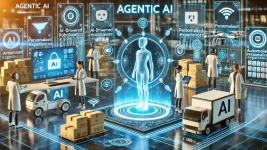Artificial Intelligence: The Unstoppable Force of Innovation

Artificial Intelligence (AI) is no longer a futuristic concept—it’s a transformative force reshaping industries, societies, and everyday life at an unprecedented pace. From personalized recommendations on streaming platforms to advanced medical diagnostics, AI is everywhere, and its growth is accelerating faster than ever before.
One of the key reasons behind AI's rapid rise is the explosion of data. Every action we take online—searching, shopping, streaming—creates data. This data, when processed by powerful machine learning algorithms, enables systems to "learn" patterns, improve over time, and make accurate predictions. In fact, the global data sphere is expected to reach 175 zettabytes by 2025, giving AI systems more fuel than ever to evolve.
Industries across the board are embracing AI. In healthcare, AI is helping detect diseases like cancer at earlier stages through imaging and predictive analytics. In finance, algorithms assess risks, detect fraud, and provide automated customer support. Meanwhile, in manufacturing, AI-driven robots are improving production efficiency and safety. What once took years of research and human effort can now be optimized in days through intelligent systems.
One of the most noticeable impacts of AI is in natural language processing (NLP). Tools like OpenAI's, ChatGPT and Google's Gemini are capable of understanding and generating human-like language, powering everything from virtual assistants to real-time translation services. This advancement is not only changing how businesses interact with customers, but also how people learn, write, and collaborate.
The accessibility of AI tools has also democratized innovation. Today, developers, startups, and even hobbyists can use pre-trained models, open-source libraries, and no-code platforms to create AI applications without deep expertise in data science. This ease of entry is speeding up AI integration into apps, websites, and services at a grassroots level.
However, this growth also comes with challenges. Concerns over data privacy, algorithmic bias, job displacement, and ethical use are more pressing than ever. Governments and institutions are working on frameworks and regulations to ensure AI is developed and used responsibly. Discussions about AI ethics, transparency, and governance are becoming central to the broader conversation.
Looking ahead, AI is expected to drive even more disruption—autonomous vehicles, personalized medicine, climate modeling, and even creativity in art and music. According to PwC, AI could contribute up to $15.7 trillion to the global economy by 2030. This isn’t just a technological revolution—it’s an economic and cultural one.
In conclusion, the growth of AI is not just fast—it’s exponential. As it becomes more powerful and accessible, the opportunities it creates are immense. But with that power comes responsibility. Staying informed, adaptable, and ethically aware will be crucial for individuals and businesses hoping to thrive in the AI-driven future.

Artificial Intelligence (AI) is no longer a futuristic concept—it’s a transformative force reshaping industries, societies, and everyday life at an unprecedented pace. From personalized recommendations on streaming platforms to advanced medical diagnostics, AI is everywhere, and its growth is accelerating faster than ever before.
One of the key reasons behind AI's rapid rise is the explosion of data. Every action we take online—searching, shopping, streaming—creates data. This data, when processed by powerful machine learning algorithms, enables systems to "learn" patterns, improve over time, and make accurate predictions. In fact, the global data sphere is expected to reach 175 zettabytes by 2025, giving AI systems more fuel than ever to evolve.
Industries across the board are embracing AI. In healthcare, AI is helping detect diseases like cancer at earlier stages through imaging and predictive analytics. In finance, algorithms assess risks, detect fraud, and provide automated customer support. Meanwhile, in manufacturing, AI-driven robots are improving production efficiency and safety. What once took years of research and human effort can now be optimized in days through intelligent systems.
One of the most noticeable impacts of AI is in natural language processing (NLP). Tools like OpenAI's, ChatGPT and Google's Gemini are capable of understanding and generating human-like language, powering everything from virtual assistants to real-time translation services. This advancement is not only changing how businesses interact with customers, but also how people learn, write, and collaborate.
The accessibility of AI tools has also democratized innovation. Today, developers, startups, and even hobbyists can use pre-trained models, open-source libraries, and no-code platforms to create AI applications without deep expertise in data science. This ease of entry is speeding up AI integration into apps, websites, and services at a grassroots level.
However, this growth also comes with challenges. Concerns over data privacy, algorithmic bias, job displacement, and ethical use are more pressing than ever. Governments and institutions are working on frameworks and regulations to ensure AI is developed and used responsibly. Discussions about AI ethics, transparency, and governance are becoming central to the broader conversation.
Looking ahead, AI is expected to drive even more disruption—autonomous vehicles, personalized medicine, climate modeling, and even creativity in art and music. According to PwC, AI could contribute up to $15.7 trillion to the global economy by 2030. This isn’t just a technological revolution—it’s an economic and cultural one.
In conclusion, the growth of AI is not just fast—it’s exponential. As it becomes more powerful and accessible, the opportunities it creates are immense. But with that power comes responsibility. Staying informed, adaptable, and ethically aware will be crucial for individuals and businesses hoping to thrive in the AI-driven future.
